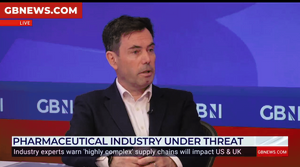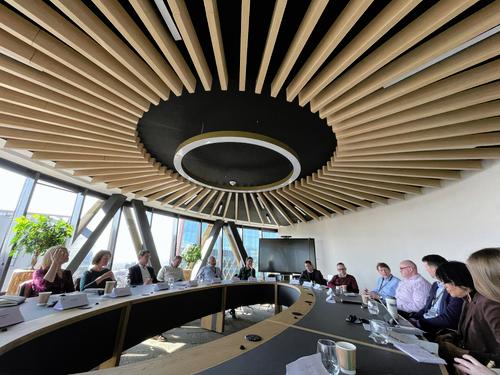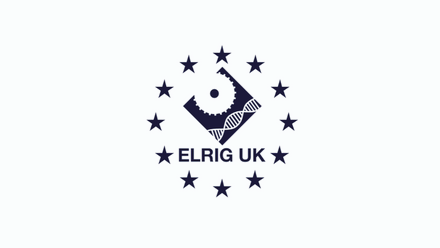CEO Update - 7 April 2025
The pharmaceutical sector was carved out in the official Trump tariff announcements but industry consensus is that this exemption will be brief before a further forthcoming planned sector-focused announcement from the US Administration. Eli Lily’s Dave Rick’s summed up US CEO sentiment by saying these tariffs are “hard to come back from”.
EU meeting sector leaders to consider response
A senior European Commission official said on Thursday:
We obviously don’t know what will come on sectors like pharmaceuticals or semiconductors, but one can only guess that it will be a similar approach taken on those other sectors.
If that is the case and President Trump follows the same approach he took with metals and cars, that would mean a sector-specific tariff of 25 percent. This is the reason why Commission President Ursula von der Leyen will meet with Europabio and pharma bosses on Tuesday to talk it through. I’ve briefed EuropaBio CEO Claire Skentelbery with our initial thoughts.
UK position emerging
Here in the UK, I am not expecting to have to wait until May for the UK government to take action on the economy – this afternoon’s speech by PM Keir Starmer gave an indication of the direction of travel. In the speech, the prime minister announced plans for a national health data research service. This service will help streamline secure access to health data across the UK. We have been calling for a national approach to health data access for some time, so this is a great result for our sector. By removing the red tape and streamlining access to data in a secure way, innovators across the sector will be better placed to discover and develop healthcare solutions for patient benefit. Last year’s Sudlow review of health data rightly called for BIA to sit on the advisory board of this service in recognition of the importance of our sector. We look forward to working with the Wellcome Trust and Government to ensure the service works for UK SMEs, so that life changing innovations can be brought to the public faster than ever before.
UK Industrial strategy will be sped up, and policies will be proactively released -similar to the change in rules for diesel car production – and I expect similar announcements to touch our sector, perhaps within days. The review of arms-length bodies and the restructuring of the state and civil service will also be sped up. One aim of this is to drive growth to new levels and reinvigorate investor appetite for UK innovation by making it easier to establish and run small Venture capital trusts, private equity and hedge funds.
The Guardian newspaper reports this morning that:
Other sectors to be hit by Trump’s tariffs are expected to receive support later in the week, with life sciences likely to be among them.
I am engaging closely and will report back on this.
Pharma leaders met the UK government last week and ABPI conference heard the readout - VPAG review by June
Last week, I joined the ABPI conference which came on the back of the IFPMA Biopharmaceutical Chief Executives (BRC) roundtable in London. As part of that event, Global pharma CEOs met with the Prime Minister and key cabinet members to discuss the UK’s support for life sciences and discuss key issues, including the state of the UK as a market for pharma companies and the concern about higher-than-expected VPAG rebate rates.
The key outcome of these meetings was announced by Wes Streeting at the ABPI conference, namely that the VPAG review will be brought forward from the autumn to conclude in June. Listening at the ABPI conference, it was striking to hear Wes Streeting saying that the UK needed to stop seeing medicines as a “deadweight cost” as opposed to an “investment”. It was clear that the Health Secretary’s intention is to get the VPAG review out of the way, and move on to “bigger and more important things” for the sector.
UK keeps on investing in innovation
Somewhat hidden under all this is the news that a record £13.9 billion of R&D funding has been unveiled to boost innovation, jobs and growth as allocations were set by UKRI for the coming year on Friday. The stability and continuity in this position enabling basic science and innovation policy is welcome, and stands in strong contrast to the uncertainty unleashed across US science by Elon Musk’s DOGE drive in recent weeks.
Also, ARIA (the UK’s Advanced Research and Invention Agency) has appointed eight more programme directors in its second cohort as it widens its targets and it prepares to allocate the second half of its initial £800 million five-year funding - see their profiles. It's great to see many of them in areas we are focused on.

Busy on the media – thanks for the feedback
Thank you to members for your kind responses to my media appearances ahead of the Tariff announcements - it's clear we have a group that listens to BBC Radio 4 and a group that watches GB news – although not, I think in equal amounts!
Unlocking the North East's life sciences potential:
a roundtable discussion on innovation, challenges, and opportunities with Select Committee MPs
Despite all this, we still managed to hold a fantastic roundtable with the chair of the Science, Technology and Innovation committee, Chi Onwurah MP and Newcastle life science companies on Friday.

We explored the North East’s immense potential in life sciences, from world-class universities to pioneering biomanufacturing. We heard from life science companies about imbalanced R&D funding, difficulties in scaling innovation, and a lack of investment-ready capital.
The discussion highlighted the urgent need to leverage Newcastle’s lower costs and strong research ecosystem. There is a need to bridge the gap in commercial skills and develop a culture that encourages entrepreneurship.
We will be submitting the round table as evidence to the Science, Technology and Innovation Committee's enquiry into innovation, growths and regions.






